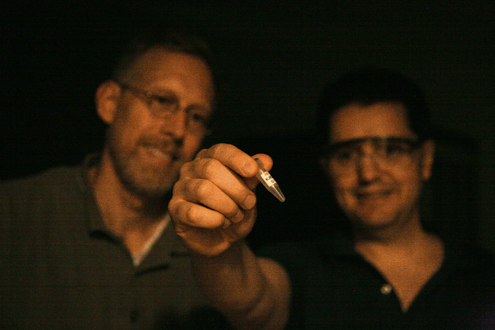
In this file photo, UMSL’s James Bashkin (left) and Kevin Koeller display a vial that contains an antiviral drug candidate designed to fight HPV, the virus that causes cervical cancer. They co-authored a study on HPV that was recently published in PLOS ONE, an international, peer-reviewed, online scientific journal. (Photo by August Jennewein)
While there is no cure for human papillomavirus, in most people the body will clear the infection on its own. But in a small subset the infection becomes persistent. Virtually all cervical cancers are caused by HPV infections.
Understanding interactions in human cells between HPV DNA and new drug candidates is at the center of research being directed by James Bashkin, professor of chemistry and biochemistry at the University of Missouri–St. Louis, and Chris Fisher, a cell and developmental biologist. Together they co-founded the company NanoVir LLC, of which the University of Missouri is part owner.
Bashkin, along with Kevin Koeller, a research assistant professor of chemistry at UMSL, in conjunction with scientists at NanoVir are working to develop an antiviral drug to eliminate many types of HPV from infected patients. A study by this combined team was recently published in PLOS ONE, an international, peer-reviewed, online scientific journal. The study, “DNA Damage Repair Genes Controlling Human Papillomavirus (HPV) Episome Levels under Conditions of Stability and Extreme Instability,” characterizes the mechanism by which their novel antiviral compounds prompt cells to selectively destroy human papillomavirus DNA.
The work demonstrates that the NanoVir/UMSL compounds bind and alter the structure of HPV DNA, rendering the viral DNA extremely unstable and susceptible to destruction by the cell. These active antiviral agents are in preclinical development.
Bashkin and Fischer’s research has also garnered international attention. Their DNA-targeted therapies were the focus of an article that appeared in the European trade journal EU Research. The story begins on page 30 of volume 2013, issue 3.
The HPV research was principally funded by the National Institute of Allergy and Infectious Diseases of the National Institutes of Health.
To read the full research study in PLOS ONE visit www.plosone.org/article/info%3Adoi%2F10.1371%2Fjournal.pone.0075406.














